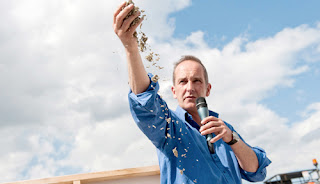...
Hey what do you mean 'Bah Humbug'?! Oh alright... I'll keep things holly and jolly. But just in case you were interested in how Christmas carbon footprints have changed over the years, Best Foot Forward have made this Christmas Carol Infographic: The Carbon Footprint of Christmas Past, Christmas Present and Christmas Yet to Come.
Infographic Developed by Best Foot Forward. More information can be found on their website.
Having said that, Santa really is very un-green. I mean, my gosh, have you seen how much energy goes into his yearly traditions?! According to this very accurate study undertaken by Ethical Ocean, Santa releases up to 69.4 million metric tonnes of CO2 in ONE DAY! And approximately 97% of that is held within the life cycle of toys. This is simply unacceptable!
Graph taken from Ethical Ocean's infographic: Santa's Carbon Footprint.
From production to packaging and disposal, toys are by far the single most devastating contributors to climate change. So-called 'good' children around the world are leading to the untimely demise of this Earth. Not only that though, but the reindeer Santa uses to fly across the world are horrific methane producers. And, of course, there's Santa's polluting factory in the North Pole, which emits around 983,000 metric tonnes of CO2 into the atmosphere.
I think, having gained a better idea of Santa's inefficient and polluting methods, it is safe to say that - for the greener good - Christmas should just be cancelled. Or at the very least, he should get operations ISO 14001 certified.
Nooooooo don't worry kids this is all completely made up. Santa is nothing but goodness. Don't you know he uses magic to make all the toys in a special room where he lives; he has a few elf helpers, but that's got nothing to do with child labour. And his reindeer are way too awesome to ever let out any methane - except Dasher, I hear he suffers from IBS.
On a more serious note though... (I know, I know, bah humbug - but I wouldn't have this blog if I never put any green messages out), have a think about your impact this Christmas. Wrapping is obviously a big issue but it goes a lot further than that (and that's easy to recycle anyway). Christmas is so consumption-driven these days and that's when things get the least environmentally-friendly. And remember it's not about the presents... Haha, OK it's not ONLY about the presents, it's about sharing the good times, stuffing your face with (locally-produced and organic) food, and realising that you're half way out of the dark and wintery months.
MERRY CHRISTMAS EVERYONE!















